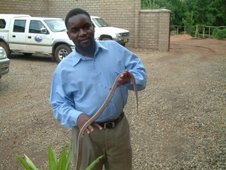
(This article appeared in the Sunday Times of 10 September, 2006)
Three years missing in the mountain
by Hastings Maloya
“Three years gone, yes but I still have a feeling like it is only a dream,” says Emie Suliwa almost shading tears in disbelief. She raises her head and through my office window she looks at the magnificent Mulanje Mountain. Shakes her head again and says, “in that mountain, my friend Linda Pronk went missing three years ago.”
Emie works as an office assistant for InfoMulanje, the information centre that offers all tourism information about Mulanje Mountain. When I normally call her to my office, her expectation is that there is some information that she needs to collect or has to clarify on the number of tourists that have visited the mountain in a given period. Wednesday, September 13, could not have been a good day to call Emie to my office.
It was far from what she had expected. She was shocked when I mentioned to her that I wanted to have a brief interview with her as I was writing an article on the missing of Linda in Mulanje Mountain. She recalled, it was on September 13, and this was exactly three years after the demise. For a while, I had to change the subject a bit to let her take a breath before continuing with the interview.
Linda Pronk, a 22-year-old Dutch citizen, served as a development worker with the Voluntary Service Overseas (VSO) working in the laboratory of the CCAP Mulanje Mission Hospital. On Saturday 13th September, 2003, Linda set off, alone, to climb Sapitwa peak, the highest point of Mount Mulanje. She has not been seen since.
Linda was no stranger to Mulanje, she worked at the CCAP Mission Hospital and had enjoyed climbing the mountain many times, explains Emie.
“We went up the mountain on Friday and we were a group of more than seven. We camped at the newly constructed Chisepo hut and we had all the fun that is associated with mountain climbing,” recalls Emie. “I left the mountain early on Saturday because I had some assignments to sort out down here. We agreed with Linda to meet the following day as she still remained with other friends. I never knew; it was the last time that I had seen her”.
On this particular day, while they were still at Chisepo hut, basically the base of Sapitwa, it is said that Linda expressed an interest to climb the peak and was advised by the rest of the group not too attempt it on her own. Later, it was noticed that she was not on the vicinity of the camp and apparently she might have started off to the peak. That was all about the young Dutch girl.
The alarm was raised early on the Sunday morning and a message was sent down speedily to Likhubula Forest Office. The request for assistance was communicated to the Mulanje Mountain Conservation Trust and Mulanje Mission Hospital, and soon after, the police were also informed.
I was in office that Sunday but I could not know what to do let alone where to start from, if indeed I was to do anything. There was no rescue plan at hand, no specified leadership, no trained personnel, little equipment and no radio communication! However, there was a rapid reaction from concerned organisations and institutions immediately, a base was established at Kambenje Village, and a search had started.
According to Carl Bruessow, Executive Director of MMCT, the main achievement that day was the climb that was made in very difficult rains by some porters to reach Chisepo with radio and other basic supplies so that there was at least communication between top and bottom. Police, porters, friends, forestry staff and colleagues all rallied to join the effort but lo! there had been no sign of Linda during the searches made in the vicinity of the Sapitwa path. The stormy, wet cold weather atop made life even more difficult.
First thing Monday morning, I got a call from the Daily Times, I stammered before confirming that indeed we were in a situation as a young lady is missing in the mountain. “We are trying all we can and I am hopeful that we may succeed by the end of the day.” I said and could not take more questions. Just as I thought that was enough, it was another call from the Nation, then Power 101fm, before MBC came in. I could tell indeed how serious this issue is. What with the BBC getting wind of the news and their correspondent was already on line for clarification.
Then came a game capture helicopter from Majete Wildlife Reserve to assist in a sky search, if only to raise the morale of Linda, should she be stuck somewhere in that bad weather. Sunday, Monday and Tuesday saw very difficult weather conditions with strong cold winds, heavy cloud and rain prevailing for most of the days.
The area above Chisepo towards Sapitwa is very rugged with many steep slopes interspersed by boulder-strewn stream valleys. According to Bruessow, the helicopter flew at least ten hours of aerial searches over these days negotiating the difficult winds around the peaks. Seven days later, the search effort was beginning to lose momentum as people had to leave the mountain to attend their normal commitments. Hope was beginning to be lost.
In the October - December, 2006 edition of Sapitwa newsletter, Bruessow wrote, “the improved weather over the next four days through to Saturday enabled a full search to be launched and coordinated. At full capacity between 60 and 75 searchers worked the rugged mountain-top carrying out group line searches, often covering priority areas several times.”
All efforts by the army and police bore no fruits. Another effort ten days later was made by a number of dog-sniffer teams who flew out from the Netherlands and gave of their time over five days, again turning up with nothing. And as Bruessow puts it, ordinarily, in any usual situation Linda should have been found but it was not to be and the reason for this failure will elude us for some time.
Thirty-one local traditional healers and medicine men came with different skills and different approaches. Others went through the office of the District Commissioner while others came through village heads and recognised local leaders. They raised the hopes that one of them would succeed in finding the missing lady. It could not work.
Preachers and leaders of different religious beliefs and sectors also participated in the search. They used different approaches and methodologies, still it is three years this week, no success registered.
As for the local people living around the mountain, ancestral spirits played a role in the missing of Linda. They say there are spirits in the Mulanje Mountain Forest Reserve and can react in case they are not happy with a particular situation.
“My advice is that we should visit the mountain with respect. This is a treasurer for the people of Mulanje and Phalombe. It must be respected,” says a chief from Phalombe without elaborating.
To date, there is nothing conclusive as to what exactly happened. Someone is yet to come up with a possible assumption. And Emie concludes our interview saying, “sometimes you can not tell about this mountain. Some things you just can not understand them, maybe thus what makes it more important.”
All in all, this tragic incident on the mountain should serve to remind us all to strongly adhere to the well-established safety principles that guide mountain climbing.
No-one can really tell what exactly happened to Linda. However, notwithstanding this unfortunate event, Mount Mulanje remains one unique resource for Malawi as it continues to attract tourist from all over the world. According to the laws of Malawi, Linda shall only be declared dead after seven years. Practically, we have four more years to concretely say the final word about her. But then, where is she? Living in the mountain?
Hastings Maloya is Programme Officer for environmental education
and communications for the Mulanje Mountain
Conservation Trust (MMCT)











